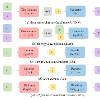Next Point-of-Interest (POI) recommendation is a critical task in location-based services that aim to provide personalized suggestions for the user's next destination. Previous works on POI recommendation have laid focused on modeling the user's spatial preference. However, existing works that leverage spatial information are only based on the aggregation of users' previous visited positions, which discourages the model from recommending POIs in novel areas. This trait of position-based methods will harm the model's performance in many situations. Additionally, incorporating sequential information into the user's spatial preference remains a challenge. In this paper, we propose Diff-POI: a Diffusion-based model that samples the user's spatial preference for the next POI recommendation. Inspired by the wide application of diffusion algorithm in sampling from distributions, Diff-POI encodes the user's visiting sequence and spatial character with two tailor-designed graph encoding modules, followed by a diffusion-based sampling strategy to explore the user's spatial visiting trends. We leverage the diffusion process and its reversed form to sample from the posterior distribution and optimized the corresponding score function. We design a joint training and inference framework to optimize and evaluate the proposed Diff-POI. Extensive experiments on four real-world POI recommendation datasets demonstrate the superiority of our Diff-POI over state-of-the-art baseline methods. Further ablation and parameter studies on Diff-POI reveal the functionality and effectiveness of the proposed diffusion-based sampling strategy for addressing the limitations of existing methods.
翻译:推荐下一个兴趣点(POI)是位置服务中的一个关键任务,旨在为用户的下一个目的地提供个性化建议。以前关于POI推荐的研究已经集中在建模用户的空间偏好上。然而,利用空间信息的现有方法仅基于用户先前访问位置的聚合,这使模型不鼓励在新领域推荐POI。这些以位置为基础的方法的这个特征将在许多情况下损害模型的性能。此外,将时序信息纳入用户的空间偏好仍然是一个挑战。在本文中,我们提出了Diff-POI:一种基于扩散的模型,用于对下一个POI推荐进行采样。受扩散算法在从分布中采样的广泛应用的启发,Diff-POI使用两个定制的图形编码模块对用户的访问序列和空间特征进行编码,然后使用基于扩散的采样策略来探索用户的空间参观趋势。我们利用扩散过程及其反向形式从后验分布中采样,并优化相应的分数函数。我们设计了一个联合训练和推理框架来优化和评估所提出的Diff-POI。对四个真实世界的POI推荐数据集进行的广泛实验表明,Diff-POI优于最先进的基准方法。进一步的消融和参数研究表明,所提出的基于扩散的采样策略应对现有方法的局限性是有效的。

